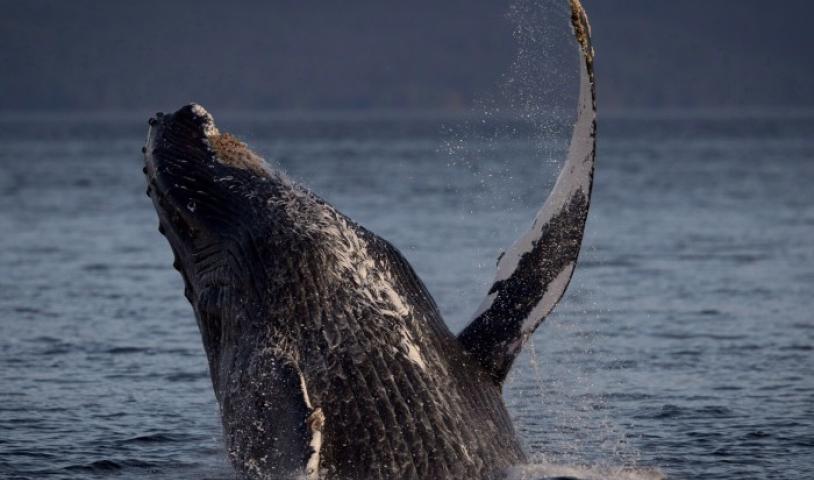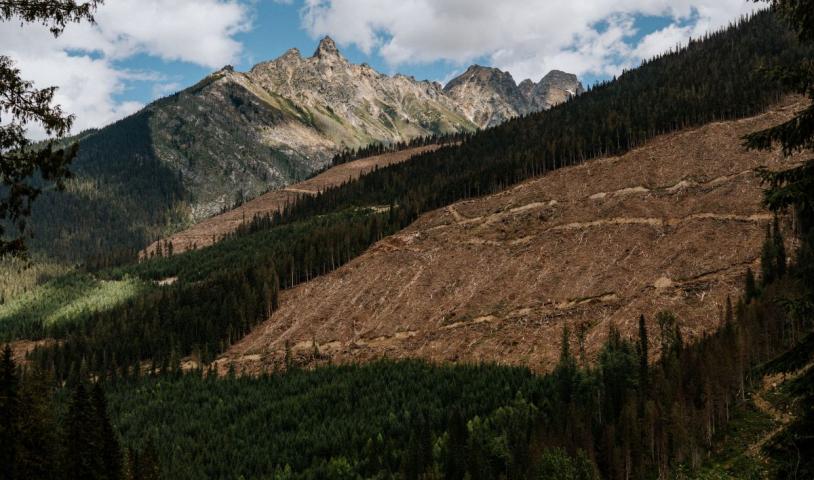Humpback whales being sacrificed on the altar of industrial development: critics
Wednesday, April 23, 2014
Environment critics are calling Conservatives out for their “entirely political” and thinly veiled attempt to secure the proposed $7.9 billion Enbridge Northern Gateway pipeline by downgrading the Pacific humpback whales’ habitat protection.
If the change passes, the humpback whales’ habitat will no longer be protected from tankers or pipelines, which many say was the whole point of the downgrade. Given the economic and business stakes in getting the Northern Gateway route approved and the federal Tories’ desire to have some pipeline, any pipeline, bring Alberta oilsands bitumen “to tidewater,” critics are suspicious of the reclassification.
Kevin Stewart, a researcher with Greenpeace Canada, doesn’t believe oil tankers and humpback whale habitat can exist in harmony and is especially concerned that a pipeline would negatively affect breeding and endanger humpback calfs.
“The decision to remove protections from humpback whales is entirely political and it is entirely about getting that pipeline approved,” said Stewart.
Celebrating Earth Day in Vancouver, Green party leader Elizabeth May told iPolitics she expects the outrage over the humpback whales to be the focus of the event she’s attending.
“This is being justified by the fact — and it is a fact — that their population is doing better, but that’s because of the protective measures,” said May.
Several environmental groups, including Greenpeace Canada, the David Suzuki Foundation and the Sierra Club, recently challenged the government’s environmental track record in court.
Federal Justice Anne Mactavish ruled in February that the Environment Minister Leona Aglukkaq and Fisheries Minister Gail Shea had broken the law by failing to enforce the Species at Risk Act (SARA).
“The problem with SARA is clear: successive governments have failed to implement it fully,” said David Suzuki in a Toronto Star op-ed months after the suit was filed in September 2012.
On the connection between the SARA requirements and the humpback downgrade, May was adamant:
“It would be naive to think there was no connection. Environmental lawyers had already identified that the protections for the humpback whales under the SARA represented a hurdle, and by downgrading the protection of humpback whales they’ve removed that hurdle,” said May.
In the case of four specific species, one of which being the Pacific humpback whale, the government had failed to propose recovery strategies after the species were formally identified, missing mandatory deadlines by up to six and a half years.
During the suit, a recovery strategy was issued for the humpback whale but with the change of status comes a change of paperwork. The department will now need to issue a management plan instead, but that should come soon according to Trevor Swerdfager, Assistant Deputy Minister, Ecosystems and Fisheries Management.
“My expectation is that they will be substantially in advance with this one because most of the work is already done in the form of the recovery strategy, so we’ll be moving forward on that quite quickly.”
Recovery strategies are currently required for 192 species, of which 163 were overdue when the case was heard in January. Swerdfager confirmed that number hadn’t changed much since.
Unfinished plans could potentially help with the development of the Northern Gateway pipeline by failing to place limits on industrial expansion in endangered regions.
“As environmentalists, we asked ourselves: ‘how can the government protect the critical habitat of the humpback whale and allowing tankers to go through it’ and now we know how the answer to that. They’re doing it by downgrading the species and dramatically reducing protection,” said Gwen Barlee, policy director with Wilderness Committee.
“It increases the magnitude of risk because now its critical habitat won’t be protected from oil tankers.
Nathan Cullen, the NDP MP from Skeena-Bulkley Valley, said he wishes he could be more shocked by the news.
“I’ve just been dealing with this government for so long on pipelines and their belligerent attitude that almost nothing could surprise me anymore. It’s amazing: however many votes we have, whatever science we use is, it’s all for nothing compared to the amount of power the oil lobby has on the Harper government.”
Liberal environment critic John McKay agreed.
“A few whales here or there I don’t think is of great concern [to the government] when there is shipping to be done.”
Environment Minister Aglukkaq is recommending, on advice from the fisheries minister, that the local species be downgraded from “threatened” to “species of special concern”.
Neither Aglukkaq nor Fisheries Minister Gail Shea was available for comment.
“From the point of view of the department, the various other agendas that people are attributing to our work and the suggestion that this is tied into the pipeline or any other development is just not so. Essentially this is a matter of responding to scientific advice,” said Swerdfager.
The change would be made under SARA after an independent committee determined in 2011 that the local species was recovering at a consistent enough rate to relax security precautions.
If approved, the number of tankers carrying oil and bitumen through Vancouver Harbour and the Gulf Islands each year may increase from about 60 to more than 400, and over 525,000 barrels per day of diluted bitumen crude would move from Alberta to Kitimat, according to Ecojustice.
That committee was cited frequently in the Enbridge Northern Gateway Project Joint Review Panel, which reviewed the threats to humpback whales after critics and locals questioned the likelihood of fatal collisions and the negative effects of sound on the species.
The Northern Gateway’s repeated response in the report was that the shipping industry has only grown in the past few decades and with proper mitigation policies, so has the humpback whale population.
The government is accepting responses for 30 days after the decision was published, then the change will go into effect immediately once approved by the Governor-in-Council.






